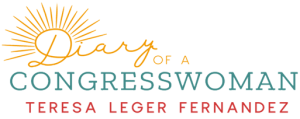Mary-Charlotte Domandi:
And we’re talking today hours before the vote on the American Rescue Plan in the house. I know this has been the subject of our conversation quite a bit on the last few podcasts, but it is definitely the central focus right now.
Teresa Leger Fernandez:
I was working on a billion dollars.
MCD:
Nice work if you can get it.
TLF:
Yeah, I know. I was just sharing that when I go home and have a conversation with my partner and he says, how did it go today? And I almost can’t remember everything because every day has such a list of things that are incredible and remarkable that sometimes I forget if I don’t go back and look at a calendar, like, what did I do first thing in the morning? It’s like, Oh my God, we worked on that. So in this historic moment where we have a majority in the house and a majority in the senate, president, no matter how slim those majorities are, the fact that we are working as hard and as diligently and as creatively on everything that we’re doing to make a difference just is energizing. And it is so much. So right now, where am I at? I am looking at the remarks that I will get to make on the floor of the House regarding the American Rescue Plan. I’ve been asked to speak specifically about what the bill does regarding Native Americans. And so how do you capture, in one minute, the scope and breadth of what we doing here. We had a conversation with President Nez from the Navajo nation earlier, and he says, would you talk about the fact that we very much appreciate that you put money in for native languages? Tell them what we’re doing at Navajo. And he told me this beautiful story of how they are involved in taking the Navajo nation language to Mars.
MCD:
What?
TLF:
So it’s like, is that like too great to imagine? And so, yeah, there is a Navajo scientist working at NASA. And so as they map Mars, they are using different parks, national parks. So one of the parks is Canyon de Chelly. They are then identifying places using Navajo nation language. So the Dineh language will be preserved as place names on Mars.
MCD:
That’s an interesting thing that you’re saying, because the connection between funding Navajo, native languages and funding our, I mean, Mars, you know, there’s another planet, but funding our planet and thinking what it takes to have really a healthy planet in the face of a century and a half of really intense devastation that has only accelerated in recent years. There was a bill that just passed preserving Western land. We don’t know if it’s going to pass the Senate, but it did pass the House. And the stimulus bill also contains some provisions that help our lands. What does that look like? How are you thinking about it?
TLF:
Well, you know, going back to my one minute of how do you synthesize so much of what we’re doing in a very short sentence is that the brilliance of our rescue package is it understands the complexities of the moment in which relive and tries to address the many needs. Americans, sometimes we’re not as good about complexity and interconnection, but there is a lot of interconnection. And it’s our job to actually recognize that interconnection and work on it. I always think about it in this way that this virus has devastated certain communities, but those communities, sometimes they’re more vulnerable because our treatment of the planet has also wreaked havoc with those communities. Like in Navajo, there is a lot of issues in terms of lack of infrastructure. But coal-fired plants in the Northwest region has led to higher levels of asthma. Asthma as an underlying condition that makes you more susceptible to severe illness and death from the pandemic. And so if we don’t recognize those interconnections, then we don’t solve the cause of the problem.
MCD:
And that’s all hard to say in one minute when you’re on the House floor, but in terms of strategizing with your colleagues to make what is on many levels, a healthier country and a healthier planet, how are you working on that now? How are you working on that today?
TLF:
The thing about my democratic colleagues in the House, and I think that there were a lot of Republicans who Willy recognize this because their communities are also going to be hit. You know, they might want to address the climate crisis in different ways, but I think I shared earlier that ran the chairs of the agriculture committee were coming around and seeking our vote that I asked each of the contenders what they were going to do about addressing the climate crisis, because there is so much money at the USDA, there is so much money in the farm bill. And every single one of them committed to addressing the climate crisis. And it wasn’t like, Oh, I’ve never thought about it, let me hem and haw. It’s like, no, absolutely. So it’s in ag, it’s in the select committee on the climate. It’s in science, it’s in natural resources, in energy and commerce.
I mean that there is a recognition that the way to address the climate is as complex as the problems with climate. It’s a health issue, it’s an economic diversification issue, it’s an education issue in our schools. It’s a transition issue for fossil fuels. It’s an issue for our infrastructure in terms of, let’s make sure we build the electrical grid that can support electric cars. You know, it’s just like it is everywhere. And what you find here among the Democratic caucus is they’re into that. And our commitment to that was reflected. And I think it was our second vote for the rules package. And the rules package says we are going to create the following select committees. And these select committees are going to focus on these multi-jurisdictional issues. And I am so proud of the speaker and the leadership in our, our Democratic caucus, because another one of the select committees is on equity and the lack of equity. So that tells you, but we’re focused on: COVID the climate and inequity.


